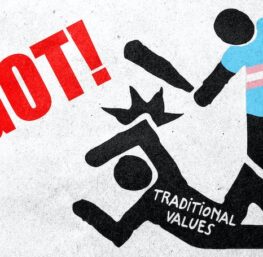This ties into a theme I’ve been working on: secular leftists are moral absolutists. I’ve been trying to sharpen this into an essay but haven’t found the nub yet. I mentioned this idea in several comments upstream.
Winning the “I Don’t Know” Crowd
Maybe the Americans who voted for Bush have questions about when life really begins and don’t want to support a party that refuses to acknowledge those concerns.
Maybe the Americans who voted for Bush wonder just how much involvement between church and state constitutes an infringement on First Amendment proscriptions against state-sponsored religion. Maybe they are troubled by absolutists who want to wipe faith out of every aspect of public life.
THESE DOUBTS and concerns don’t make them stupid or intolerant or bigoted or faith-based zealots ready to wage a jihad against those who disagree with them. It makes them average Americans. When Bush acknowledged his own doubts about the homosexuality question, he was speaking to them, telling them they don’t deserve the ugly labels absolutists from the left use to denigrate their concerns. He was legitimizing their reasonable doubts about the left’s absolutist ideology on values–gay marriage, unrestricted abortion, and an approach to state/church issues that more resembles the intolerance of anti-religion China than the tolerance of state-sponsored-religion England.
In other words, in the moral values debate, perhaps the Republican voters saw the left as the fundamentalists waging their own jihad, unwilling to acknowledge reasonable differences of opinions, let alone well-motivated doubts.
Read the entire article on The Weekly Standard website.




I agree that discussion needs to happen and that many on both sides are taking absolutist positions. So what is the conservative compromise on these issues, exactly? I haven’t heard one in this forum, at least that I recall.
Ban abortion except in the first trimester? Ban gay marriage but allow civil unions? What about divorce laws if we’re talking about marriage? Allow generic prayers with references to “God” in school but not “Christ” or “Jesus”?
Both sides are using “slippery slope” arguments and stating that any compromise will lead to either utter moral chaos or a Christian theocracy. Neither is likely to happen.
If there is no compromise to be made, how can anyone suggest that only the left is being “absolute”?
Hard left progressivism is by definition absolutist because they see the state as arbiter of moral affairs. This is why, in Canada for example, you see free speech outlawed under the rubric of “hate speech.” Homosexual behavior is construed as a civil right and any criticism of the behavior is regarded as a violation of that right. Moral absolutism is imposed, free speech is abandoned — all under the guise of geater freedom. I touch on this theme in my article The Artist as Vandal: Culture and the Desecration of Religious Symbols (also here).
The American Founding Fathers understood this threat. This is why they argued that a virtuous citizenry is necessary for the preservation of liberty.
I see that the right is becoming sensitive to the “fundamentalist” charge, and now seeks to make those on the left into fundamentalists as well. The problem is that we have to ignore a number of important differences to make that happen.
Most importantly, taking an absolutist position on political issues is only one aspect of fundamentalism, but it is not even a necessary feature of fundamentalism.
The absolutism of the left — inasmuch as it exists — is extremely different from that of Christian fundamentalist absolutism. When people talk about the left as “fundamentalist” what they mean is that some on the left are unwilling to compromise on certain social issues, and they sometimes attribute various nefarious motives and ethical deficiencies to their opponents.
The absolutism of Christian fundamentalits is very different. It originates in the belief that they and ONLY they and their co-religionists have acces to ultimate, absolute truth through their relationship with Jesus. All who fail to have the correct beliefs and experiences are utterly cut off from truth. These people, outside the fundamentalist camp, are either a) loved by God but bound for eternal torture in hell through their own free choice, or b) hated by God to begin with, and bound for hell through predestination. Those who disagree with fundamentalist beliefs are not merely wrong; they are perceived as spiritually defective. This includes Eastern Orthodox, Catholics, Wiccans, atheists, and so on.
The absolute truth claimed by fundamentalists can be both experience-based (“The Lord told me that . . . “) or text-based (“the Bible says that . . .”). The Bible is seen as the inerrant Word of God, utterly correct in all that it affirms. Anything that is inconsistent with a literal reading of the Bible (as interpreted in the fundamentalist community) is rejected. For fundamentalists there exists no standard of morality that can be rationally comprehended. Rather, [the fundamentalist interpretation of] the Bible is the source of all morality. Thus, for example, in the fundamentalist view genocide itself is not morally right or wrong. It depends on whether God commands genocide. If God commands all Caananites — men, women, children, animals — to be killed, then that is the morally correct thing to do. Whenever something in fundamentalist religion doesn’t make sense, the standard argument is that “God’s ways” are superior to “mans’ ways.” Thus, fundamentalist beliefs cannot be challenged on a rational basis unless the fundamentalists allow it.
Now to say that people on the left are “fundamentalist” is to make an erroneous generalization of monstrous proportion. It is to equate a zealous defense of certain political positions with people who have an all-consuming and anti-rational worldview operating from a position of absolute divine certainty and inerrancy, and in the belief that they and only they have access to truth.
That said, you can certainly find fanatics of every stripe, including liberal fanatics. But to portray people on the left as “fumdamentalists” is really to misuse the term. Many Christians who voted for Bush are not fundamentalists. But some are, and people on both sides of the political fence should have no illusions concerning what these people are all about.
This may be true of Protestant fundamentalists, but most Christians are not fundamentalists. Hard left progressivism however, is morally fundamentalist because they are essentially statist. The moral universe of the statist exceeds no farther than a legal conception of basic rights. The moral universe is fixed and static.
Do you understand what I mean by “progressive?” Not all liberals are progressive, but all progressives are liberals.
“Hard left progressivism is by definition absolutist because they see the state as arbiter of moral affairs.”
This means that nothing is immoral unless it’s illegal and everything that’s not illegal is not immoral? I don’t think I’ve ever heard that argument, though.
Surely even those on the far, far left would agree that it may be “immoral” to cheat on your wife and certainly grounds for divorce: they just would not criminalize the behavior, yes?
**
In regards to the “hate speech” laws of Canada, I generally oppose these unless a direct threat is made for violence towards an individual. I value our freedom of speech to much, as do most Americans. In addition, we cannot compare the Constitution of Canada to that of the US: they do not guarantee the same freedoms due to the “not withstanding” clause.
Statism is always in service to an absolutist ideology. So yes, in the end ideology trumps morality and the mechanisms of the state are employed in the service of the ideology so that the state finally determines the nature of all relationships between persons. Call it totalitarianism. Read my article.
Violence towards individuals should not be dealt with through hate crime laws, but the civil laws we already have on the books.
Fr. Hans writes: “This may be true of Protestant fundamentalists, but most Christians are not fundamentalists.”
The best figure I’ve heard is that there are around 30 million people in the U.S. who are Christian fundamentalists.
Fr. Hans: “Hard left progressivism however, is morally fundamentalist because they are essentially statist.”
Well, yes, there are people like that, but I think comparatively few. You do run into them from time to time. In my brief time in graduate school I was once accused of “oppressing women” after using “he” as a generic pronoun. But you have to realize that a lot of people on the left don’t like them either. A good friend of mine is very liberal, and very much dislikes many of the Republican office-holders at the national level. The only people he dislikes more than the Republicans are those whom he indelicately calls the “f[ ] liberal fascists.” The liberal fascists can exist at some universities under the protection of tenure. I think they have a pretty short life span elsewhere.
But compared to the influence of tens of millions of fundamentalists, now emboldened by the current administration, the liberal fascists are little more than a background buzz, if that. They irritate but they do not dominate. After the 80s I think they were largely a spent force.
The Christian fundamentalists are another matter. They hold many positions at both national and state levels. They are courted by the Republicans. They have their own TV networks and probably hundreds of radio stations. And as they have joined with the political conservatives their influence has been amplified. We are not yet a theocracy, but in ten or twenty years we may get there.